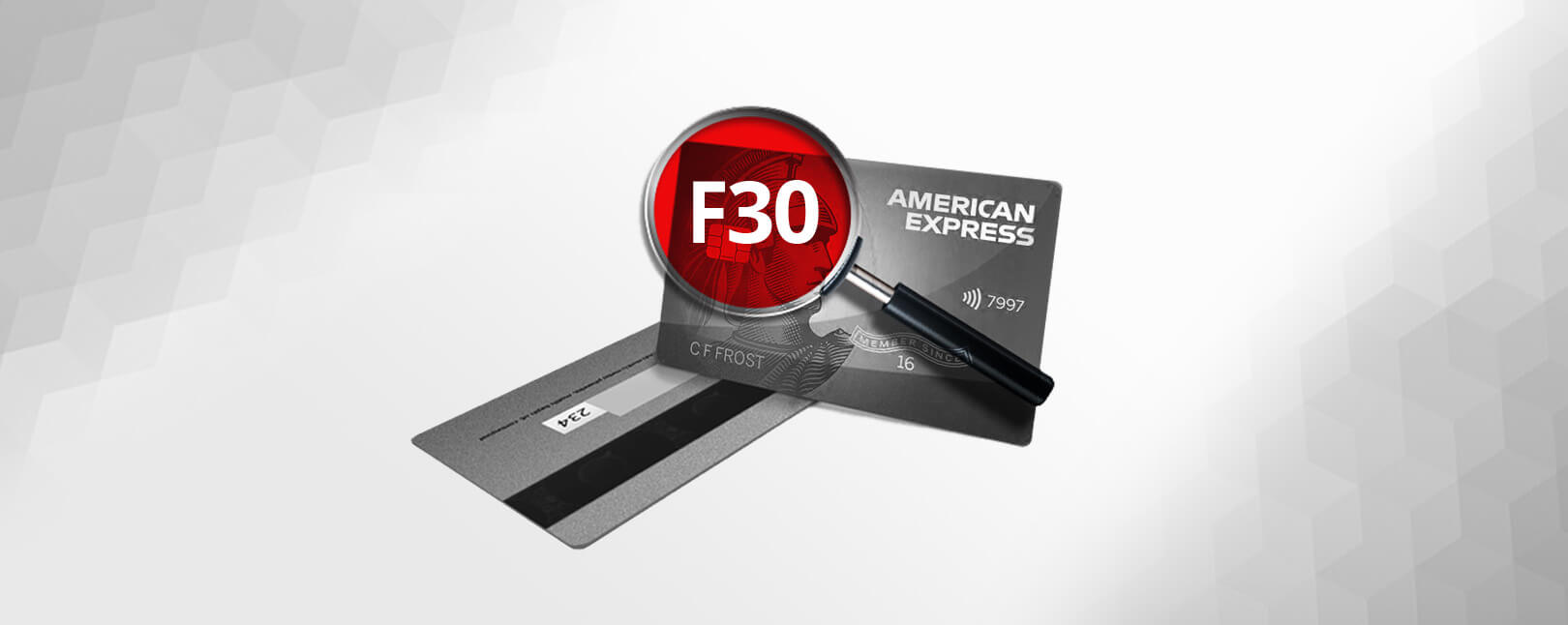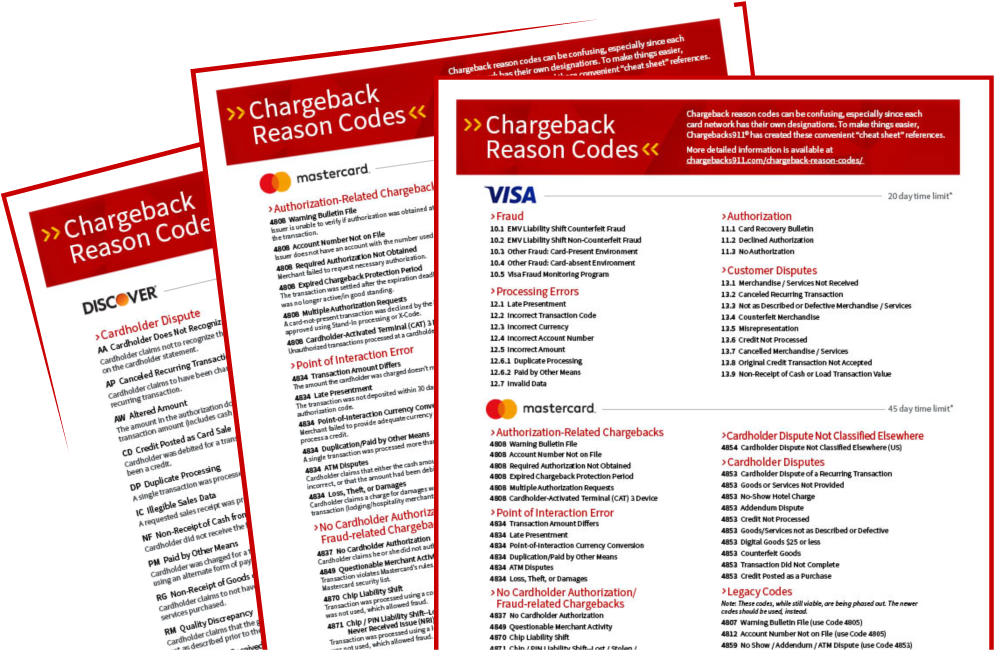
How to Handle Amex Reason Code F30 Chargebacks
American Express breaks down the acceptable causes for a customer to dispute a credit card transaction in their dispute guidelines. This is done for the sake of simplicity and standardization.
Each chargeback trigger has a designated “reason code.” Amex can then assign the appropriate code to each case to show the given reason for the chargeback.
Learn more about Amex reason codes
Today, we’re looking at one reason code in particular — F30 — and exploring the causes, timeframes, fees, and other specifics. We’ll also explore what you can do to prevent these chargebacks from happening.
Recommended reading
- Best Credit Card Processing Companies of 2025 REVEALED
- Chargeback Stats: All the Key Dispute Data Points for 2025
- What Happens When You Dispute a Transaction?
- Economic Uncertainty Pushes Consumers to File Chargebacks
- Charity Backed by Cb911® Featured on FOX13 Tampa Bay
- eCommerce Fraud Prevention: A Step-by-Step Guide for 2025
What is American Express Reason Code F30?
American Express chargeback reason code F30 is “EMV Counterfeit.” This reason code is used for card-present transactions to explain that the cardholder claims that they didn’t participate in the transaction.
In addition, the transaction was processed using a counterfeit EMV chip card. However, you didn’t process the transaction as a chip card sale. Instead, you either swiped or manually keyed-in the card information. This could’ve been because your chip reader wasn’t working at the time, or you’re using an outdated model point-of-sale machine that can’t accept chip cards.
This reason code doesn’t apply for contactless or digital wallet transactions. Both of these options use NFC technology, which uses the same tokenization protocol as EMV chip cards.
What Caused This Dispute?
Amex Chargeback Reason Code F30 is primarily issued when a cardholder’s information was compromised, then used without the cardholder’s permission. In other words, identity theft. To demonstrate, this scenario can arise if a scammer:

How to Respond to Amex Reason Code F30 Chargebacks
So, what happens if you can prove that this was not a purchase conducted using a counterfeit card?
Naturally, if you receive an Amex F30 chargeback, you’ll want to resolve the issue right away. If you feel that the chargeback was filed in error, you should file a dispute response. This is done through a process called representment.
Representment is the process through which you’ll challenge a chargeback. You provide evidence to the card issuer (in this case, American Express) that all aspects of the transaction were legitimate and in accordance with the card issuer's policies. This can involve several key pieces of evidence.
Also, remember that there’s a strict time limit to consider. You have just 20 days in which to submit your response to American Express. However, this time frame also includes the time it took for your acquirer to provide you with a dispute notification, as well as time spent by the acquirer reviewing and submitting your case. In practical terms, you’ll often have five days or less in which to prepare and submit your response.
Acceptable Evidence for Amex Reason Code F30 Responses
You can re-represent these charges under the condition that you have compelling evidence.
For American Express reason code F30 chargebacks, you’ll need to provide proof that this was a card-not-present charge, or that the POS system processed the transaction in question as a chip card transaction. Acceptable evidence may include:
- A response code, indicating EMV match
- Transaction receipts
- A positive address verification match
- Geolocation information at the time of purchase
- Shipping information provided by the buyer
- Documentation showing the transaction was submitted for processing as a CNP transaction
Alternatively, you might have already issued a credit to the buyer as a way of trying to avoid the dispute. In this case, you’ll need to offer proof that you already provided a credit to offset the amount charged.
The success of representment depends on the thoroughness and relevance of the evidence provided. Maintaining detailed records of transactions and communications with customers is vital to effectively counteract all chargebacks, including those under reason code F30.
How to Prevent Amex Reason Code F30 Chargebacks
As the old adage goes, “an ounce of prevention is worth a pound of cure.”
You may never be able to stop chargebacks entirely. But, you can limit your exposure to risk and keep your chargeback ratio in good standing by adopting a few best practices. Generally speaking, you’ll want to:
#1 | Activate EMV Technology
Ensure that your point-of-sale machine is EMV-enabled, and that you require customers to dip their chip cards for all card-present purchases.
#2 | Verify Your Buyer
Check the customer’s ID to verify that the person using the card is who they claim to be.
#3 | Wait for Authorization on Manual Transactions
If you have to manually key any transaction, make sure you have a valid authorization code, as well as an imprint of the card in question, before finalizing the sale.
#4 | Get Consent
For card-not-present purchases, ensure that you have express consent from the buyer, and that they’ve agreed to all terms and conditions before completing the sale.
#5 | Keep Good Records
Make sure you have documentation on file that ties the cardholder’s consent to the specific goods or services purchased, and the billing terms.
Take a Wider View
You can dispute invalid chargebacks from Amex reason code F30. However, it’s much more efficient to take a proactive stance. The same is true of the other chargeback reason codes, as well. A truly effective chargeback management strategy must encompass prevention as well as disputing cases of friendly fraud.
Chargebacks911® can help your business manage all aspects of chargeback reason codes, with proprietary technologies and experience-based expertise. Contact us today for a free ROI analysis to learn how much more you could save.
FAQs
Does Amex investigate chargebacks?
Yes. American Express investigates chargebacks by reviewing the evidence provided by both the merchant and the cardholder to determine the legitimacy of the transaction and decide on the chargeback claim. This process ensures a fair resolution based on the documentation and arguments presented by both parties.
What is the reason code for a chargeback on American Express card?
An American Express chargeback reason code is a code that identifies the specific reason a cardholder or issuing bank has disputed a transaction, guiding the merchant on the nature of the dispute and what evidence may be required to contest it. Each code corresponds to a particular issue, such as unauthorized use, processing errors, or non-receipt of goods or services. Click here to see a full list of Amex reason codes.
Do police investigate chargebacks?
Police typically do not investigate chargebacks as they are considered a dispute between the merchant and the cardholder, handled through the card issuer's internal processes. However, if fraud is suspected as the cause of a chargeback, law enforcement may be involved in investigating the fraudulent activities.
How successful are Amex disputes?
The success of an American Express dispute depends on the merchant's ability to provide compelling evidence that the transaction was valid and in accordance with Amex policies. Success rates vary widely based on the nature of the dispute and the quality of the documentation provided by the merchant.
How does American Express investigate disputes?
American Express investigates disputes by reviewing documentation and evidence provided by both the cardholder and the merchant, such as transaction receipts, proof of delivery, or communication records, to determine the validity of the chargeback claim. This process aims to ensure a fair resolution based on the facts presented by both parties.







